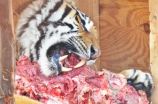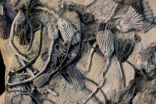(Press-News.org) Animal scientists say a raw meat diet is a good source of protein for cats, but pet owners may need to supplement with other nutrients.
In a new paper in the Journal of Animal Science, researchers from the University of Illinois at Urbana-Champaign and Omaha's Henry Doorly Zoo and Aquarium analyzed the value of raw meat diets for cats and exotic felids. The researchers used several tests to evaluate the nutrients in meat from bison, cattle, horses and elk.
To test how the different diets affected cats, the researchers collected blood serum and fecal samples from domestic cats and captive African wildcats, jaguars and Malayan tigers. The researchers also used cecectomized roosters to analyze amino acid digestibility in the different diets. Cecectomized roosters have had an organ called the cecum removed, which allows scientists to better analyze amino acids in their waste.
They found that raw meat diets met many nutrient requirements for cats, but there were some gaps. None of the diets contained the recommended levels of linoleic acid, the horsemeat did not provide the levels of arachidonic acid recommended for kittens, gestating females and lactating females.
This research is important for animal scientists, zoos and pet owners.
The researchers explain that captive tigers, jaguars and African wildcats were traditionally fed horsemeat-based raw diets.
"With the closing of horse abattoirs in 2007, the availability of quality grade horsemeat in the United States has decreased, increasing the need for research on the digestibility and composition of possible alternatives," write the researchers.
There is also a growing trend of raw meat diets for domestic housecats. Kelly Swanson, associate professor in animal science at the University of Illinois and coauthor of the study, said the researchers are "a bit wary" of pet owners feeding homemade raw diets. He said pet owners risk exposing cats to increased pathogens and nutrient imbalances.
Pet owners often feed trimmed cuts of meat. These cuts lack fat, which is crucial in feline diets. According to the researchers, if pet owners feed raw meat diets, they will likely have to supplement it with other nutrients, including appropriate sources of fat and essential fatty acids.
A high-protein diet can also change the types of microbes in the gut. The researchers write that increased protein fermentation in the bowel may lead to more "odiferous" feces, depending on the digestibility of the protein.
Joe Taft, director and founder of The Exotic Feline Rescue Center in Center Point, IN, said he feeds raw meat to the 225 large cats at the center.
"We feed the cats meat with hide and fat and bone still on it," said Taft.
Taft aims to recreate their wild diet, but he also makes changes to keep cats healthy. Cats with renal problems are given chicken, which is lower in protein. Taft also gives the felines vitamin supplements.
Taft said that though felines will eat "ripe" meat, his staff makes sure their raw meat is as fresh as possible. This caution can reduce the risk of pathogens in the meat.
The researchers recommend future studies on sources of fiber in raw meat diets. They also recommend studies on the concentration and digestibility of amino acids in different raw meats.
INFORMATION:
The paper was titled "Evaluation of four raw meat diets using domestic cats, captive exotic felids, and cecectomized roosters." It can be read in full at journalofanimalscience.org.
Scientific Contact:
Dr. Kelly Swanson
University of Illinois, Urbana-Champaign
ksswanso@illinois.edu
Media Contact:
Madeline McCurry-Schmidt
American Society of Animal Science
217-689-2435 / madelinems@asas.org
Raw meat diet may not be enough for cats (or tigers)
Pet owners risk increased pathogens, nutrient imbalances
2013-02-19
ELSE PRESS RELEASES FROM THIS DATE:
When it comes to genetic code, researchers prove optimum isn't always best
2013-02-19
COLLEGE STATION, Feb. 18, 2013 — Imagine two steel springs identical in look and composition but that perform differently because each was tempered at a different rate.
A team of researchers including a Texas A&M University molecular biologist has shown that concept — that the speed of creation affects performance — applies to how a protein they studied impacts an organism's circadian clock function. This discovery provides new insights into the significance of the genetic code for controlling the rates at which critically important proteins are synthesized, and could ...
Study: p38beta MAPK not critical to brain inflammation
2013-02-19
LEXINGTON, Ky. (Feb. 18, 2013) — A study by a leading Alzheimer's researcher at the University of Kentucky provides new evidence that will help researchers home in on the molecular mechanisms involved in inflammation of the central nervous system (CNS) and aid drug-development strategies for treating inflammatory neurological diseases.
The research was led by Linda Van Eldik, director of UK's Sanders-Brown Center on Aging, and included co-authors Bin Xing and Adam Bachstetter from the Van Eldik lab. The study demonstrated that the beta isoform of p38 mitogen-activated ...
Variations within influenza strain may explain varying patient response
2013-02-19
LOUISVILLE, Ky. – Just the mention of H1N1 can conjure up images of long lines of people waiting to be vaccinated, news reports of the severity of the pandemic and the count of the number of people who perished from the 2009-10 outbreak. However, some positives are coming forward.
Researchers at the University of Louisville have found variations within H1N1 patients who were hospitalized and identified those that most impacted patients. Their findings were published today (Feb. 18, 2013) on the PLOS ONE website.
"While all of the variants that we uncovered hijacked ...
Johns Hopkins Medicine and Fundación Santa Fe de Bogotá collaboration to focus on research, nursing
2013-02-19
An expansion of collaborative projects involving Fundación Santa Fe de Bogotá (FSFB), one of Colombia's premier health care institutions, and Johns Hopkins Medicine International (JHI) will continue for another 10 years under an agreement signed Feb. 18, 2013, in Baltimore, USA. The collaboration agreement detailing joint efforts in research and nursing, among other areas, was signed by Steven J. Thompson, chief executive officer of JHI, and Juan Pablo Uribe, chief executive officer of FSFB.
"It is a privilege to have the opportunity to strengthen our collaboration with ...
Ancient fossilized sea creatures yield oldest biomolecules isolated directly from a fossil
2013-02-19
COLUMBUS, Ohio—Though scientists have long believed that complex organic molecules couldn't survive fossilization, some 350-million-year-old remains of aquatic sea creatures uncovered in Ohio, Indiana, and Iowa have challenged that assumption.
The spindly animals with feathery arms—called crinoids, but better known today by the plant-like name "sea lily"—appear to have been buried alive in storms during the Carboniferous Period, when North America was covered with vast inland seas. Buried quickly and isolated from the water above by layers of fine-grained sediment, their ...
It's off to work we go
2013-02-19
This press release is available in French.
Montreal, February 18, 2013 – In a large city like Montreal, public transit provides us with options for getting to work or school and back home again. In deciding to choose traffic jams over metro delays, or to pay for parking rather than buy a monthly pass, you weigh the pros, cons and costs of your options, and your mental calculations are more complicated than they may appear at first glance.
In a paper recently published in The Journal of Transportation and Land Use, Zachary Patterson, an assistant professor in Concordia ...
Solar sponge' soaks up CO₂ emissions
2013-02-19
CSIRO scientists have created a 'solar sponge' which captures and then releases carbon dioxide using the power of natural sunlight.
The breakthrough presents a new way to recycle CO2 emissions using renewable energy. The 'sponge' which is made from a new smart material called a MOF - metal organic framework - adsorbs carbon dioxide, but when exposed to sunlight, instantaneously releases it.
Known as dynamic photo-switching, this capture-and-release method is extremely energy efficient and only requires UV light to trigger the release of CO2 after it has been captured ...
New evidence for link between depression and heart disease
2013-02-19
MAYWOOD, Il. - A Loyola University Medical Center psychiatrist is proposing a new subspecialty to diagnose and treat patients who suffer both depression and heart disease. He's calling it "Psychocardiology."
In his most recent study, Angelos Halaris, MD, PhD, and colleagues found that an inflammatory biomarker, interleukin-6, was significantly higher in the blood of 48 patients diagnosed with major depression than it was in 20 healthy controls. Interleukin-6 has been associated with cardiovascular disease. Halaris presented findings at a joint congress of the World Psychiatric ...
In fight against cancer, a closer look at nuclear blebbing
2013-02-19
Misshapen cell nuclei are frequently observed in the cells of people with cancer and other diseases, but what causes the abnormality -- and why it is associated with certain disorders -- has remained unclear.
Researchers at Northwestern University have recently developed a mathematical model that sheds light on the defect by clarifying the mechanisms that cause bulges known as "blebs" in cells' nuclear membranes. The research -- a collaboration between experts at the McCormick School of Engineering and Applied Science and the Feinberg School of Medicine -- could be a ...
Nesting site protection 'key to save turtles from climate change'
2013-02-19
International marine scientists today warned it will be vital to protect key marine turtle nesting grounds and areas that may be suitable for turtle nesting in the future to ensure that the marine reptiles have a better chance of withstanding climate change.
A new study reveals that some turtle populations in the West Indian Ocean, Northeast Indian Ocean, North Pacific Ocean, East Atlantic Ocean and the East Pacific Ocean are among the least likely to recover from the impacts of climate change. Mariana_19feb_2
"To give marine turtles a better chance of coping with climate ...
LAST 30 PRESS RELEASES:
Breaking the efficiency barrier: Researchers propose multi-stage solar system to harness the full spectrum
A new name, a new beginning: Building a green energy future together
From algorithms to atoms: How artificial intelligence is accelerating the discovery of next-generation energy materials
Loneliness linked to fear of embarrassment: teen research
New MOH–NUS Fellowship launched to strengthen everyday ethics in Singapore’s healthcare sector
Sungkyunkwan University researchers develop next-generation transparent electrode without rare metal indium
What's going on inside quantum computers?: New method simplifies process tomography
This ancient plant-eater had a twisted jaw and sideways-facing teeth
Jackdaw chicks listen to adults to learn about predators
Toxic algal bloom has taken a heavy toll on mental health
Beyond silicon: SKKU team presents Indium Selenide roadmap for ultra-low-power AI and quantum computing
Sugar comforts newborn babies during painful procedures
Pollen exposure linked to poorer exam results taken at the end of secondary school
7 hours 18 mins may be optimal sleep length for avoiding type 2 diabetes precursor
Around 6 deaths a year linked to clubbing in the UK
Children’s development set back years by Covid lockdowns, study reveals
Four decades of data give unique insight into the Sun’s inner life
Urban trees can absorb more CO₂ than cars emit during summer
Fund for Science and Technology awards $15 million to Scripps Oceanography
New NIH grant advances Lupus protein research
New farm-scale biochar system could cut agricultural emissions by 75 percent while removing carbon from the atmosphere
From herbal waste to high performance clean water material: Turning traditional medicine residues into powerful biochar
New sulfur-iron biochar shows powerful ability to lock up arsenic and cadmium in contaminated soils
AI-driven chart review accurately identifies potential rare disease trial participants in new study
Paleontologist Stephen Chester and colleagues reveal new clues about early primate evolution
UF research finds a gentler way to treat aggressive gum disease
Strong alcohol policy could reduce cancer in Canada
Air pollution from wildfires linked to higher rate of stroke
Tiny flows, big insights: microfluidics system boosts super-resolution microscopy
Pennington Biomedical researcher publishes editorial in leading American Heart Association journal
[Press-News.org] Raw meat diet may not be enough for cats (or tigers)Pet owners risk increased pathogens, nutrient imbalances

